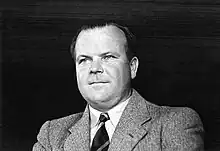Alois Vogt
Alois Vogt (19 July 1906 – 23 March 1988) was an advocate and political figure from Liechtenstein who served as the Deputy Prime Minister of Liechtenstein from 1938 to 1945.
Alois Vogt | |
|---|---|
 | |
| Deputy Prime Minister of Liechtenstein | |
| In office 30 March 1938 – 3 September 1945 | |
| Monarchs | Franz I Franz Joseph II |
| Prime Minister | Josef Hoop |
| Preceded by | Anton Frommelt |
| Succeeded by | Ferdinand Nigg |
| Personal details | |
| Born | 19 July 1906 Balzers, Liechtenstein |
| Died | 23 March 1988 Vaduz, Liechtenstein |
| Political party | Patriotic Union |
| Other political affiliations | Liechtenstein Homeland Service |
| Spouse |
Beate Hussak (m. 1948) |
| Children | 6 |
| Signature |  |
Early life
Vogt was born on 19 July 1906 in Balzers as one of six children. He attended realschule in Vaduz and from 1928 went on to study law in Innsbruck, Freiburg im Breisgau and Vienna, where he received a diploma in 1933. He then opened his own law firm in Vaduz.[1]
Career
Vogt was a co-founder of the Liechtenstein Homeland Service in 1933.[1] This party and the Christian-Social People's Party merged to form the Patriotic Union in 1936 and Vogt was placed as the party secretary.[1][2]
In 1937, he was the defending lawyer of Carl Freiherr von Vogelsang after he publicly denounced Jews living in Liechtenstein and sent numerous letters detailing them to officials in Nazi Germany and as a result Hoop ordered the offices of the Vaterland to be searched for any letters to be confiscated.[3][4][5] Members of the Patriotic Union called for Hoop to resign over the issue, but he was later acquitted of any wrong-doing.[6][7][8]
The Patriotic Union participated in the coalition government formed in the wake of World War II to prevent government deadlock and help retain Liechtenstein's neutrality overseen by Franz Joseph II[lower-alpha 1] along with Prime Minister of Liechtenstein Josef Hoop and the Progressive Citizens' Party.[9][10][11] Vogt was appointed to bocame Deputy Prime Minister of Liechtenstein under Hoop for the rest of his premiership, replacing Anton Frommelt.[12]
Despite being a member of the coalition, Vogt retained contacts within Nazi Germany throughout the 1930s and throughout, particularly with the Volksdeutsche Mittelstelle, who regarded him as a trusted contact.[1] Josef Hoop rejected the fascist tendencies of the Liechtenstein Homeland Service and remained distant from Vogt, mistrusting him.[13] He was an outspoken supporter of National Socialism throughout his premiership as Deputy Prime Minister and used his position to push relevant demands through Josef Hoop, assisted by the party's president Otto Schaedler who agitated for a more cooperative stance towards Nazi Germany.[1][14] Despite his friendly and cooperative attitude towards Germany, he played a role in thwarting the German National Movement in Liechtenstein (VDBL) when they attempted a coup in 1939 though the party still came under suspicion afterwards.[1][9] Key politicians in Liechtenstein were charged for their activities shortly after the war, and a indictment was pressed against Vogt, but he was never charged. He received a travel ban from Switzerland from April 1946 to December 1947.[1]
After the resignation of Josef Hoop in 1945[15] he went on to serve in the board of education until 1950. He served in the Landtag of Liechtenstein from 1949 to 1966 and then as the Vice President of the State Court of Justice of Liechtenstein from 1969 to 1974.[1]
Vogt died on 23 March 1988, at the age of 81 years old.[1]
Personal life
Vogt married Beate Hussak (born 26 May 1924)[lower-alpha 2] on 9 October 1948 and they had 6 children together.[1]
Notes
- Franz I was still officially Prince of Liechtenstein at this time, he had made Franz Joseph his regent following the Anschluss of Austria and moved to a family estate in Czechslovakia, where he died on 25 July 1938 and Franz Joseph II formally suceeded him.
- Source is over 12 years old, this may no longer be accurate.
References
- Schremser, Jürgen (31 December 2011). "Vogt, Alois". Historisches Lexikon (in German). Retrieved 26 May 2023.
- "Parties in Liechtenstein 1921-1943". Prince and People: Liechtenstein Civics (in German). 2007. Retrieved 14 May 2023.
- "Regierungschef Josef Hoop ordnet im Rahmen der "Spitzelaffäre" eine Hausdurchsuchung bei Carl von Vogelsang an". Staatsarchiv des Fürstentum Liechtenstein (in German). 23 January 1937. Retrieved 20 July 2023.
- "Alois Vogt teilt der Regierung mit, dass Carl von Vogelsang das Land verlassen habe". Staatsarchiv des Fürstentum Liechtenstein (in German). 24 January 1937. Retrieved 20 July 2023.
- Schremser, Jürgen (31 December 2011). "Vogelsang, Carl Freiherr von". Historisches Lexikon (in German). Retrieved 20 July 2023.
- "Die Vaterländische Union fordert Regierungschef Josef Hoop im Zuge der Spitzelaffäre zum Rücktritt auf". Staatsarchiv des Fürstentum Liechtenstein (in German). 23 April 1937. Retrieved 20 July 2023.
- "Dem Rechtsprofessor Hans Nawiasky zufolge hat Regierungschef Josef Hoop in der "Spitzelaffäre" nicht verfassungs- oder gesetzwidrig gehandelt". Staatsarchiv des Fürstentum Liechtenstein (in German). 28 June 1937. Retrieved 20 July 2023.
- "Dem Schweizer Bundesrichter Hans Steiner zufolge hat Regierungschef Josef Hoop im Rahmen der "Spitzelaffäre" nicht kompetenzwidrig gehandelt". Staatsarchiv des Fürstentum Liechtenstein (in German). 1 July 1937. Retrieved 20 July 2023.
- Marxer, Wilfried (31 December 2011). "Patriotic Union (VU)". Historisches Lexikon (in German). Retrieved 14 May 2023.
- "Liechtenstein's Prince Franz Josef II, 83". Los Angeles Times. 15 November 1989. Retrieved 25 May 2023.
- "Parties in Liechtenstein 1921-1943". Prince and People: Liechtenstein Civics (in German). 2007. Retrieved 14 May 2023.
- "Mitglieder der Regierung des Fürstentums Liechtenstein 1862-2021". Des Fürstentums Liechtenstein (in German). Retrieved 27 May 2023.
- Geiger, Peter (31 December 2011). "Hoop,_Josef_(1895–1959)". Historisches Lexikon (in German). Retrieved 15 May 2023.
- Schremser, Jurgen (14 May 2023). "Schaedler (Schaedler), Otto". Historisches Lexikon (in German). Retrieved 15 May 2023.
- "Liechtenstein Gets New Chief". The New York Times. 4 September 1945. Retrieved 16 May 2023.